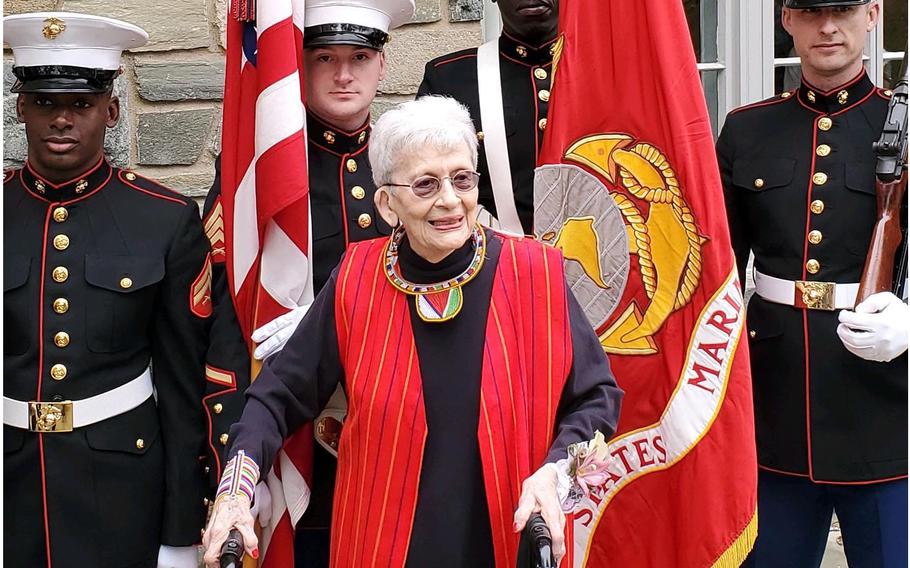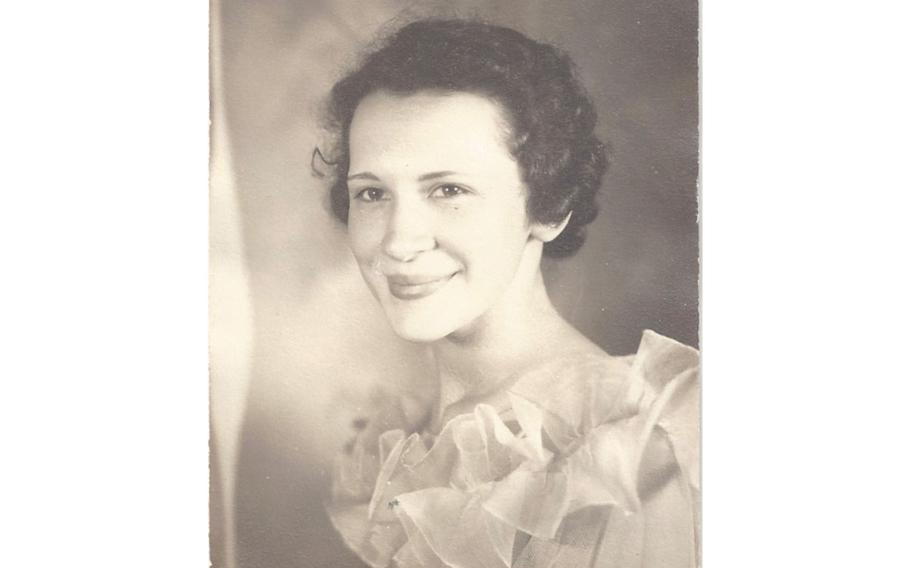
A Marine color guard visited Betty Printz Sims, who was a fixed gunnery trainer in World War II, at her Knollwood Community in Washington, D.C., for her 100th birthday three years ago. (Rebekah Sims)
When Betty Printz Sims was exacting with her family — which wasn’t too often, because she was mostly a jovial and gentle mother — they figured she was simply bringing her music teacher persona home.
“I was maybe in my 30s when I found out she was a Marine. In my 50s when I understood what she did,” said her younger daughter, Rebekah Sims, who finally had the explanation for her mother’s need for precision in the annual family Christmas carol singalong.
Printzy, as she preferred to be called, wasn’t just a Marine, but a fixed gunnery instructor. She wasn’t allowed in combat under the old rules, so instead she taught World War II fighters how to shoot like her.
“These pilots were highly incensed,” Printzy said, in an interview stored in the Library of Congress archives. “Number one, they had to have training, because some of them had come back from Solomon Islands and Guadalcanal and shot by the seat of their pants. And number two, to have women to train them. That was highly insulting to them.”
Printzy was believed to be the United States’ oldest female Marine veteran until last week, when she died in her sleep at age 104 in D.C.
In 1941, Printzy was a graduate of Grinnell College and a music teacher in a small, German town in Iowa. Her life changed on Dec. 7 when she was huddling under the covers in her bed because “our landlady was so cheap she wouldn’t turn the heat up,” listening to the New York Philharmonic on the radio. The broadcast was interrupted announcing the bombing of Pearl Harbor.
“And I thought, where is Pearl Harbor?” she said.
“All I knew was I didn’t want to continue teaching music in a little town in Iowa,” she said. “I want to do something constructive for the war effort.”
She unsuccessfully tried to join the Red Cross. So she went to Des Moines and visited all the recruiting stations, trying to find a way to help.

Betty Printz Sims, in yellow chiffon at a banquet in the 1940s, went on to become one of the few, female fixed gunnery instructors in the Marine Corps during World War II. (Family photo)
Sims said this was the moxie that defined her mother’s life. While most women joined the war effort by planting victory gardens or riveting in factories, her mom — proud that one of her ancestors had been part of the colonial Marine force — was determined to become a Marine.
She kept asking her mom: “Why the Marines?” But beyond the family history, it seemed it was simply the spirit of adventure in Printzy, something supported by her parents, who encouraged a free-range childhood in the 1920s.
She arrived at Camp Lejeune for “six whole weeks” of basic training, up at dawn, drilling, marching. She wanted to be a control tower operator, but her application to the aviation division diverted her to the fixed gunnery department.
She was trained to shoot like a fighter pilot and became a trainer, sitting in front of pilots in a simulator on the base, holding the stick and projecting images of a German Focke-Wulf or a Japanese Betty on the screen in front of them, drilling their reflexes.
“In operating a stick, it was difficult to wear skirts,” she said. “We went to the quarter master to ask for male pants.” So the three female gunnery trainers had to carry around the letters proving they were allowed to wear pants because they were turned away from the mess hall when they showed up and weren’t in skirts.
She never rose above the rank of corporal, enduring it when the men “bilged” her by staining her paperwork with an ink bottle before she was about to turn it all in and calling her and the other women derogatory words. The women endured and strengthened their sisterhood.
After the war, Printzy worked at a music store in New York and roomed with six other female Marines who headed to the Big Apple to chase their dreams. She eventually met her husband, who was in the Navy, at a funeral.
They lived a military life, moving around, raising two daughters. Printzy had a vibrant life as a music teacher, establishing choirs on every base she inhabited, from Germany to Virginia. She always worked. And, like most working moms, she worried that she wasn’t being an attentive mother, Sims remembered.
“ ’I was so anxious,’ she would confess to me,” Sims said. “And I told her: ‘You were a great mom.’ ”
When her husband died in 1985, she propelled herself into overdrive, traveling with a group of women, staying active in local politics and putting on musical productions and more choirs.
She was a star at the Knollwood Community in D.C., running more singing groups and still produced the big, holiday production when she was 102.
But she was growing tired, weakened by a bout with COVID-19 and frustrated that her failing eyesight and hearing slowed her down.
The Sunday before she died, when one of her six grandchildren (she also has nine great-grandchildren and two great-great-grandchildren) visited her, Printzy had one last plan.
“Get me a wheelchair,” Sims said her mom instructed. “I want to get out of here.”